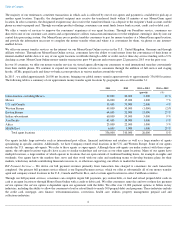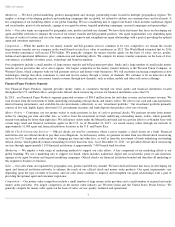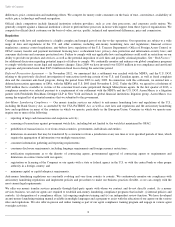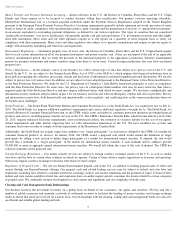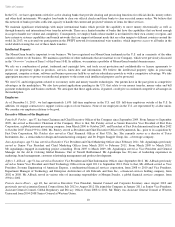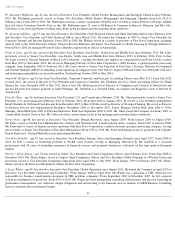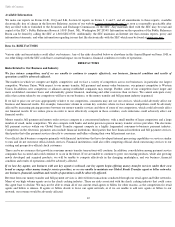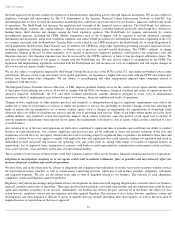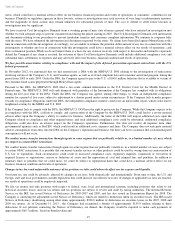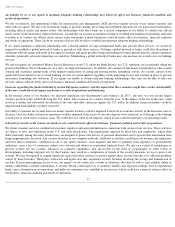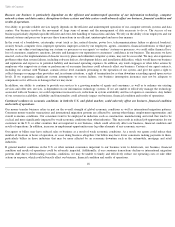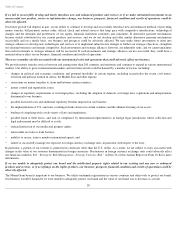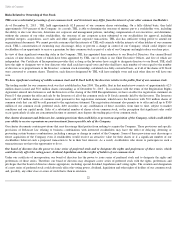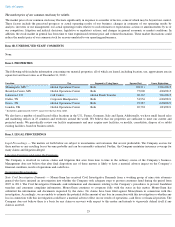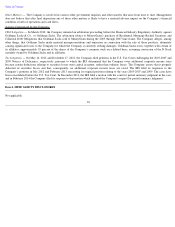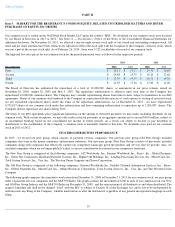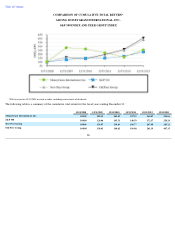MoneyGram 2013 Annual Report Download - page 18
Download and view the complete annual report
Please find page 18 of the 2013 MoneyGram annual report below. You can navigate through the pages in the report by either clicking on the pages listed below, or by using the keyword search tool below to find specific information within the annual report.
Table of Contents
taxable income earned through December 31, 2013
. An unfavorable outcome in these audits or other tax reviews or audits could result in higher
tax expense, including interest and penalties, which could adversely affect our results of operations and cash flows. We establish reserves for
material known tax exposures; however, there can be no assurance that an actual taxation event would not exceed our reserves.
Our substantial debt service obligations, significant debt covenant requirements and our credit rating could impair our access to capital and
financial condition and adversely affect our ability to operate and grow our business.
We have substantial interest expense on our debt, and our ratings are below “investment grade.”
This requires that we access capital markets that
are subject to higher volatility than those that support higher rated companies. Since a significant portion of our cash flow from operations is
dedicated to debt service, a reduction in cash flow could result in an event of default, or significantly restrict our access to capital. Our ratings
below investment grade also create the potential for a cost of capital that is higher than other companies with which we compete.
We are also subject to capital requirements imposed by various regulatory bodies throughout the world. We may need access to external capital
to support these regulatory requirements in order to maintain our licenses and our ability to earn revenue in these jurisdictions. An interruption of
our access to capital could impair our ability to conduct business if our regulatory capital falls below requirements.
Sustained financial market illiquidity, or illiquidity at our clearing, cash management and custodial financial institutions, could adversely
affect our business, financial condition and results of operations.
We face certain risks in the event of a sustained deterioration of financial market liquidity, as well as in the event of sustained deterioration in the
liquidity, or failure, of our clearing, cash management and custodial financial institutions. In particular:
If financial liquidity deteriorates, there can be no assurance we will not experience an adverse effect, which may be material, on our ability to
access capital and on our business, financial condition and results of operations.
We have significant exposure to loss in the event of a major bank failure or a loss of liquidity in the bank deposit market.
In the event of a major bank failure, where bank regulators elect to impose losses on uninsured depositors, we would face major risks to the
recovery of our bank deposits used for the purpose of settling with our agents, and to the recovery of a significant portion of our investment
portfolio. At December 31, 2013 , we maintained cash, cash equivalents and interest bearing deposits of $3.0 billion
at commercial banks in the
United States in excess of the FDIC insurance limit of $250,000
per bank. We also had cash, cash equivalents and interest bearing deposits of
$0.2 billion at commercial banks outside of the United States that are not subject to insurance protection against loss.
A major bank failure that results in a loss to depositors could cause a significant reduction in liquidity in the global financial system. Such an
event could result in our inability to access funds in our investment portfolio, cash management accounts, and clearing accounts, which would
limit our ability to settle our funds transfers and check presentments on a timely basis. Any delay in settlement of our payment services
obligations can adversely impact our business, our financial condition, and our results of operations, as well as cause damage to relationships
with our agents.
Such a liquidity event in the banking system could also result in our banks’
inability to meet their funding obligations under our revolving credit
facility, which would also contribute to our difficulties in meeting our payment services obligations, especially in a global liquidity crisis. From
time to time, we access the bank market for debt, which represents a significant portion of our capital structure. Our ability to access debt
markets is essential to our liquidity, and the sustained loss of liquidity to debt markets could result in a material adverse impact on us, especially
if our existing debt is approaching its maturity.
16
•
We may be unable to access funds in our investment portfolio, deposit accounts and clearing accounts on a timely basis to settle our
payment instruments, pay money transfers and make related settlements to agents. Any resulting need to access other sources of liquidity or
short-
term borrowing would increase our costs. Any delay or inability to settle our payment instruments, pay money transfers or make
related settlements with our agents could adversely impact our business, financial condition and results of operations.
•
Our revolving credit facility is one source of funding for our corporate transactions and liquidity needs. If any of the banks participating in
our credit facility were unable or unwilling to fulfill its lending commitment to us, our short-
term liquidity and ability to engage in
corporate transactions such as acquisitions could be adversely affected.
•
We may be unable to borrow from financial institutions or institutional investors on favorable terms, which could adversely impact our
ability to pursue our growth strategy and fund key strategic initiatives, such as product development and acquisitions.


